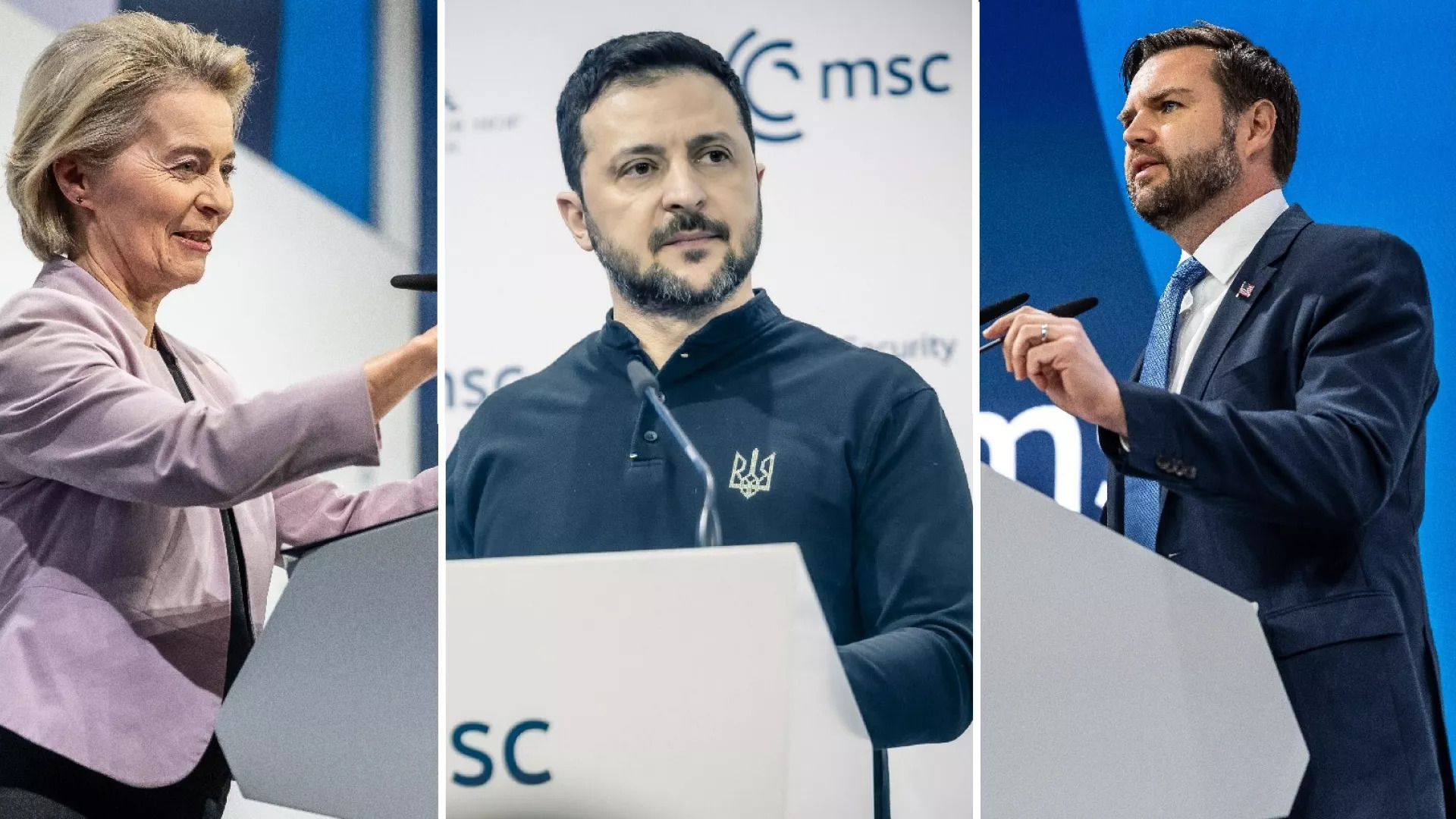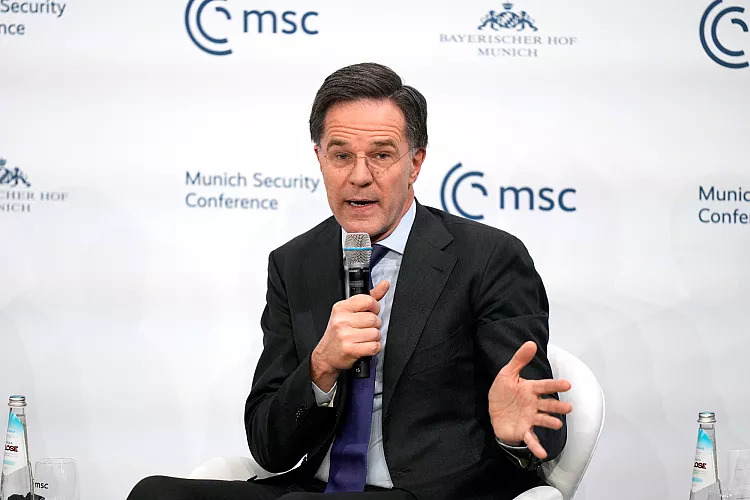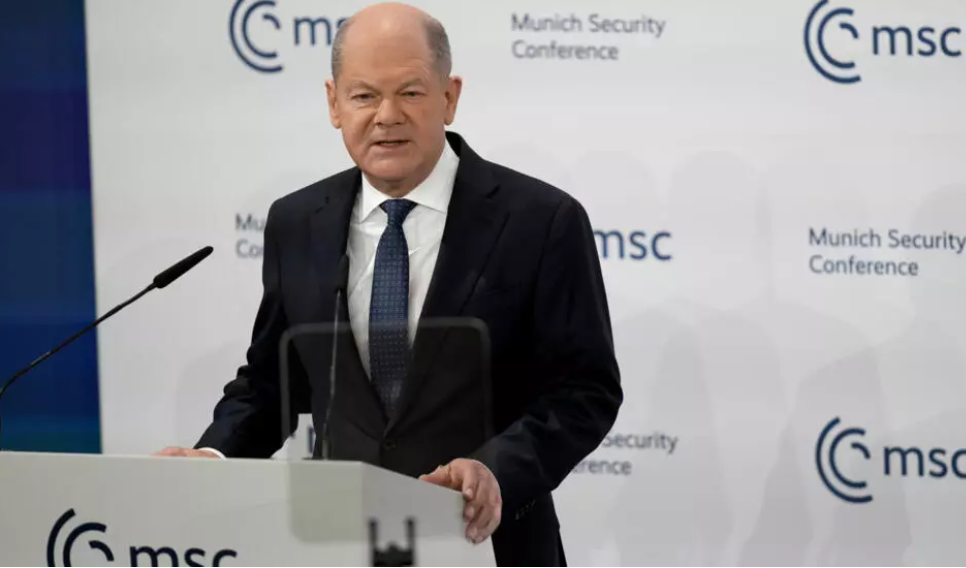
(Copyright: Munich Security Conference)
On Feb. 16, the 61st Munich Security Conference came to a close with a tearful farewell by the current chairman, Christoph Heusgen, and a hasty handover to the incoming chairman, Jens Stoltenberg. More than 150 government leaders and official representatives from some 50 countries, together with experts, scholars and practitioners from the defense, diplomacy and strategic sectors, engaged in passionate, in-depth discussions over two days about current international hot spots and strategic and security-related issues.
As an important platform for transatlantic strategic coordination, the conference was held at a particularly pivotal moment. The international order is undergoing profound adjustment and restructuring. Three days before the opening, the Munich Security Report 2025 — titled “Multipolarization” — was released. The report pointed out that the extent to which today’s world is multipolar may be debatable, but global multipolarization is a fact.
The report said that some dimensions of the international system continue to look very unipolar, and the United States will not be giving up its “top dog” position in the near future. At the same time, there is a trend pointing toward a new bipolar era in which the U.S. and China are the only superpowers and everyone else is lacking either the economic or military capabilities to clear the great-power threshold. Further, the world is moving toward more multipolarity, with countries such as Brazil, France, Germany, India, Japan and Russia seen as important global powers.
Europe is now facing the most challenging geopolitical situation since the end of the Cold War. This year's Munich Security Conference comes at a time when Donald Trump has begun his second term as U.S. president, and it is highly likely that the United States will abandon its historic role as Europe’s security guarantor. The report predicts that the Trump administration will prioritize containing China and supporting Israel. Thus the U.S. commitment to NATO and Ukraine will likely suffer, as will U.S. involvement in multilateral institutions.
The report highlights a triple crisis for the European Union: Russia’s war against Ukraine has destroyed Europe’s security order, and geoeconomic tensions and structural economic weaknesses are jeopardizing Europe’s prosperity. The European model of liberal democracy faces unprecedented internal and external strain. Donald Trump, as early as December, before his inauguration, was already sending clear signals to Europe demanding that NATO members increase defense spending to 5 percent of GDP. U.S. Secretary of Defense Peter Hegseth publicly called on European nations to take primary responsibility for the defense of the continent, creating a widespread sense of anxiety.

NATO Secretary General Mark Rutte speaks as he participates in a panel discussion during the Munich Security Conference, Germany, Feb. 15, 2025. (AP Photo / Matthias Schrader)
In addition, Europe is facing significant internal political challenges. Traditional political parties in Europe are experiencing declining public support, while far-right forces are on the rise. Just one day before the Munich conference began, a public safety incident occurred in the city. A car rammed into a crowd, resulting in two deaths and more than 20 injuries. The suspect was an Afghan refugee. Moreover, just three weeks before, in the state of Bavaria, a 2-year-old boy and a man were killed in a knife attack in a kindergarten in the city of Aschaffenburg. The suspect was a 28-year-old Afghan whose asylum application had been rejected. Such incidents have sparked intense debates within Germany regarding refugee policies. Further opportunities have arisen for far-right parties and movements to gain support.
Beset by both internal and external challenges, the annual gathering in Munich came with hope that solutions might be found for issues including the Ukraine war and Middle East crisis, the strengthening of transatlantic relations and addressing Trump’s “America first” foreign policy. Offering potential ways forward, the Munich Security Report highlighted several options for the EU, including continuing to increase security investment, diversifying trade relations and strengthening ties with Global South countries.
On transatlantic relations, the report continues to pin hope on the attitude of the U.S. government, emphasizing that the extent to which the Trump administration follows through on its announcements will determine whether the EU must recalibrate its relationship with the United States or go as far as to emancipate itself from Washington to become a more autonomous pole. This is regarded by the report as a herculean task. Whether the U.S. and Europe would coordinate on major strategic and security issues at the conference was a matter of great concern for all participants.
That concern was reflected in the range of topics set for this year’s conference, such as “Doing More With Less U.S.,” “Strengthening European Defense,” “Building or Burning Bridges: Economic and Development Cooperation Amid Multipolarization,” “Pay or Pray? NATO, the U.S., and Transatlantic Security” and “Transformation or transition? Seeking transatlantic common ground.”
What took Europe by surprise was the speech delivered by U.S. Vice President JD Vance, who was attending the security conference for the first time. His remarks at the opening ceremony were a cold shower for European nations. Vance completely ignored European concerns and made no mention of the U.S. stance on the current international order or major global issues. Instead, in a rather condescending tone, he suggested that Europe had become complacent in upholding these values and had lost sight of their significance. He criticized European policies on immigration, multiculturalism and approach to the rule of law, triggering strong discontent from European officials. Throughout the subsequent discussions and speeches at the conference, there was a consistent sense of disappointment and dissatisfaction with the U.S., alongside an emphasis on the need for Europe to become a “third pole” with greater autonomy.
After listening to two days of the conference and engaging in deep discussions with many participants, I have the following impressions of this year’s event:
First, there are significant fractures in the transatlantic alliance. Security, economics and values are the three pillars of the alliance, but coordination between the U.S. and Europe has faced clear challenges in all these areas.
The European security framework, centered on NATO, is at risk due to the U.S. reducing its commitments. Europe is also concerned that the U.S. and Russia might bypass European voices to reach agreements on Ukraine. In economics, Trump has threatened to impose tariffs on European allies, while Europe’s strict regulations on AI have led to high compliance costs for major American AI companies trying to enter the EU market, causing significant frustration in the U.S. Vance’s criticism that “Europe is gradually moving away from some of its most fundamental values” has undermined some of the foundations of the transatlantic alliance.
On the other hand, it was evident that U.S. and European strategic elites continued to engage in deep and frequent coordination at Munich. Multiple European leaders appealed to the United States, emphasizing that “America is stronger only when united with Europe.” Numerous members of Congress and think tank experts were active across various discussions and side-events, coordinating their positions in policy discussions. Establishment elites from both sides persisted in hyping the “China threat,” amplifying perceived challenges from China to underscore the importance of transatlantic unity. President Alexander Stubb of Finland predicted in his remarks that U.S.-European coordination would persist, stating that if Trump’s potential negotiations with Putin were to fail, Washington would ultimately seek European collaboration to resolve the Ukraine crisis.

Germany's Chancellor Olaf Scholz during the Security Conference at the Bayerischer Hof Hotel in Munich, Germany on Feb. 15, 2025. France and Germany reject U.S. interference after Vance urges Europe to accept far right. (AP Photo / Matthias Schrader)
Second, the pace toward European strategic autonomy is expected to accelerate. Many participants believe that Vance’s speech served as a wake-up call for Europeans, reminding them to stand more united, take responsibility for Europe's future and resolutely defend their democratic and liberal values. German Chancellor Olaf Scholz said that the future of European democracy is for Europeans themselves to decide. European Commission President Ursula von der Leyen called for the EU to expedite its defense integration efforts and urged member states to increase defense spending to 3 percent of GDP. Czech Prime Minister Petr Fiala noted that the war in Ukraine has heightened Europeans' collective consciousness, and affirmed that Europe is capable of achieving much, even without allies.
On Ukraine, the core message from European leaders was that Europe will not accept any peace plan for Ukraine without participation. Several European leaders traveled to Paris after the conference to attend an emergency summit on Ukraine, aiming to enhance coordination and develop concrete proposals to present a unified European stance in future negotiations.
Last but not least, a multipolar world order is gradually taking shape. The “multipolarity” emphasized in the Munich Security Report means that shifts in global power distribution are shaping a new world structure, with an increasing number of international actors gaining the ability to influence critical global issues. This year’s report dedicates separate chapters to China, India, Brazil and South Africa as representative nations of the Global South, while repeatedly mentioning the role and status of the BRICS group.
Since 2022, the Munich conference has significantly expanded its invitations to representatives from Global South countries, aiming to garner support from the “silent majority” regarding the Russia-Ukraine war. This year, the number of participants was increased by more than 30 percent, including a substantial number of guests from the Global South. Further, in discussions on emerging issues such as climate change, energy security, food security, biosecurity, cybersecurity and AI governance, international organizations, NGOs and international crisis coordination groups actively participated and even led the discourse. These entities expressed dissatisfaction and concern over the U.S. government’s reduced investment in international organizations and its “America first” foreign policy. They value and acknowledge China’s role in addressing these critical issues affecting humanity and are potential allies and forces that China can collaborate with in future international governance efforts.